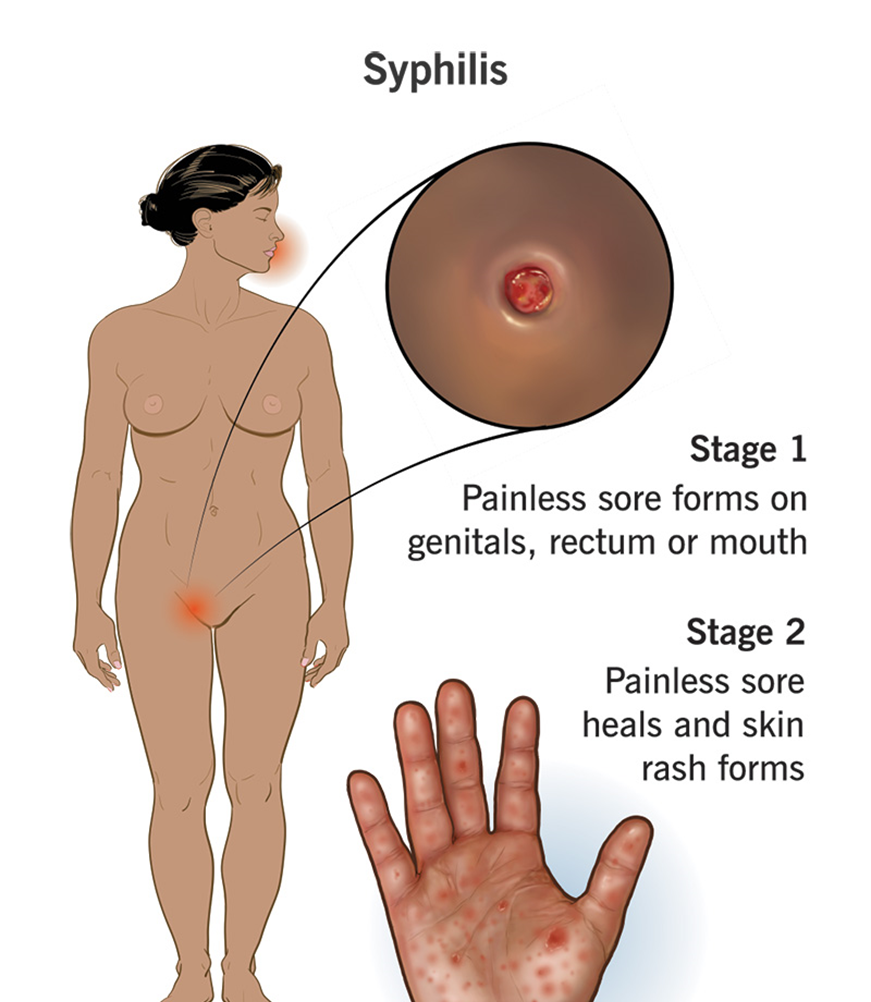Which of the following is a bacterial infection that spreads through any form of unprotected sex and by skin contact? Typically, it has stages of increasingly serious symptoms. If untreated, it may affect the heart, eyes, and brain. It can be treated with antibiotics.
Gonorrhea
Syphilis
Chlamydia
Trichomoniasis
The Correct Answer is B
Choice A reason: Gonorrhea is incorrect because it is not the infection described in the question. It is a bacterial infection that spreads through any form of unprotected sex, but it does not have stages of symptoms or affect the heart, eyes, and brain. It can cause pain, discharge, and inflammation in the genitals, anus, or throat. It can be treated with antibiotics.
Choice B reason: Syphilis is correct because it is the infection described in the question. It is a bacterial infection that spreads through any form of unprotected sex and by skin contact. It has stages of symptoms, such as sores, rashes, fever, and fatigue. If untreated, it can affect the heart, eyes, and brain, causing serious complications. It can be treated with antibiotics.
Choice C reason: Chlamydia is incorrect because it is not the infection described in the question. It is a bacterial infection that spreads through any form of unprotected sex, but it does not have stages of symptoms or affect the heart, eyes, and brain. It often causes no symptoms, but it can cause pain, discharge, and bleeding in the genitals or rectum. It can be treated with antibiotics.
Choice D reason: Trichomoniasis is incorrect because it is not the infection described in the question. It is a parasitic infection that spreads through any form of unprotected sex, but it does not have stages of symptoms or affect the heart, eyes, and brain. It can cause itching, burning, and odor in the genitals. It can be treated with antiparasitic drugs.

Nursing Test Bank
Naxlex Comprehensive Predictor Exams
Related Questions
Correct Answer is C
Explanation
Choice A reason: A biophysical profile score of 8 is a good indicator of fetal well-being, but it does not measure the fetal lung maturity. It consists of five parameters: fetal breathing movements, fetal movements, fetal tone, amniotic fluid volume, and nonstress test.
Choice B reason: Phosphatidylglycerol (PG) is a phospholipid that is present in the fetal lung surfactant. Its presence indicates that the fetal lungs are mature, while its absence does not rule out the possibility of maturity.
Choice C reason: Lecithin and sphingomyelin are two phospholipids that are found in the fetal lung surfactant. The L/S ratio is the ratio of lecithin to sphingomyelin in the amniotic fluid. A ratio of 2:1 or higher indicates that the fetal lungs are mature and can produce enough surfactant to prevent respiratory distress syndrome.
Choice D reason: A nonstress test is a test that measures the fetal heart rate and its response to fetal movements. A reactive test means that the fetal heart rate increases by at least 15 beats per minute for at least 15 seconds twice in a 20-minute period. This indicates that the fetus is healthy and well-oxygenated, but it does not reflect the fetal lung maturity.
Correct Answer is B
Explanation
Choice A reason: This is incorrect. Decreased production of erythrocytes (red blood cells) is a consequence, not a cause, of iron deficiency anemia. Iron is needed to make hemoglobin, the protein that carries oxygen in the red blood cells. Without enough iron, the body cannot produce enough hemoglobin or red blood cells¹.
Choice B reason: This is correct. Inadequate intake of iron is the most common cause of iron deficiency anemia during pregnancy. Pregnant women need more iron than nonpregnant women to support the increased blood volume and the fetal growth. If the dietary intake of iron is not sufficient, the body will use up its iron stores, leading to iron deficiency anemia.
Choice C reason: This is incorrect. Dilution of hemoglobin concentration is a normal physiological change during pregnancy, not a cause of iron deficiency anemia. The blood volume increases by 20% to 30% during pregnancy, while the red blood cell mass increases by only 15% to 20%. This results in a lower concentration of hemoglobin in the blood, but not necessarily a lower amount of hemoglobin or iron³.
Choice D reason: This is incorrect. The fetus establishing iron stores is not a cause of iron deficiency anemia during pregnancy, although it can contribute to it. The fetus needs iron for its own development and growth, and it obtains iron from the mother through the placenta. The fetal iron demand increases in the second and third trimesters, when the fetus accumulates iron in its liver and other tissues. This can deplete the maternal iron stores, especially if the mother does not consume enough iron.
Whether you are a student looking to ace your exams or a practicing nurse seeking to enhance your expertise , our nursing education contents will empower you with the confidence and competence to make a difference in the lives of patients and become a respected leader in the healthcare field.
Visit Naxlex, invest in your future and unlock endless possibilities with our unparalleled nursing education contents today
Report Wrong Answer on the Current Question
Do you disagree with the answer? If yes, what is your expected answer? Explain.
Kindly be descriptive with the issue you are facing.
